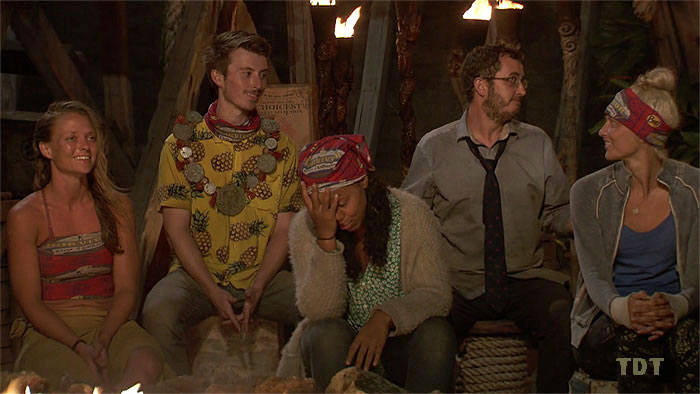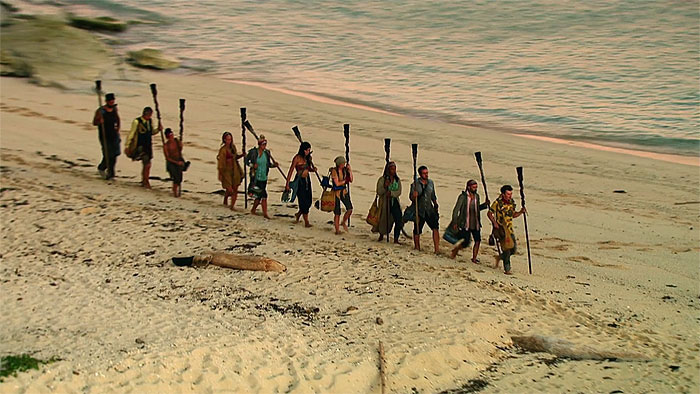

I know it’s been said already this week, but when castaways began walking toward Tribal Council with seemingly 55 minutes left in the episode, it was easy to predict an amazing tribal.
But, let’s make this clear: It was not close to the best tribal ever. Oh, sure, I enjoyed watching what happened, but I’m not sure I really like so much getting up and discussing during tribal. Not my favorite. And the bad idol play kind of stunk also.
I will admit, however, even though we still know nothing about any of the castaways’ long-term strategies or motivations, Edge of Extinction is at least now giving us fun episodes. That’s a step in the right direction.
Let’s talk about what went wrong for Julia, though. This is something we all could predict at worst last week, but really the week Joe went home. As Probst mentioned to start off tribal this week: The game is all about trust. If you’re on Survivor, you know everyone is your competition, but you also need to trust.
That brings us to swift trust theory. Developed by organizational scholar Debra Meyerson, swift trust theory essentially describes the type of quick, non-binding trust that develops within some, non-permanent organizational structures. These structures could include a sports team, a work group, the group your professor puts you in for projects … anything of that sort.
In this type of organization, there is no time for traditional forms of trust to build. Instead, people must come together and develop a flimsy form of trust very quickly since they need this to succeed.
The key? Swift trust is not nearly as strong as traditional forms of trust.
Think about how you are with friends. If you’re like me, you probably give everyone the benefit of the doubt at first. But if your friend of 20 years does something to break your trust, they’ll probably earn it back much quicker than an acquaintance who does the same thing. Does this make sense? Swift trust is the trust you develop quickly, but it can end just as quickly.
When you think about Survivor, it’s all about swift trust. The Kama Six felt this type of trust between each other, but when the three went against Ron and Julie to vote out Eric, they broke that trust. They also showed the former Lesu members they could not be trusted. If this was real life, and the castaways had a more traditional form of trust between them, Julia and Gavin would have fewer issues breaking trust and gaining it back. With swift trust, though, that’s impossible. You can see that in studies like this one, which illustrates how swift trust is incredibly fragile.
Julia, Gavin and, to a lesser degree, Victoria, thought they could make a Big Move™ and take out Eric. The problem, as others have mentioned, is that when you make a move that early, a move that shakes up the game, you better have a majority. Julia and Gavin thought they could eliminate Eric and then figure out the future later.
They couldn’t.
You see, in Survivor, swift trust is essential and tenuous. And when you show everyone you don’t deserve it, well, it’s super hard to get it back.
OK, that’s enough theory, let’s talk individual players:
Vata

- Victoria: Well, I think Victoria’s most impressive skill is to kind of worm her way into every majority. She seems to have no qualms about bouncing back and forth between alliances, all the while upsetting nobody. It’s a good skill to have and what makes her game impressive so far.
- Devens: After last week’s debacle, Devens ends up looking great this week. I feel like he might have a revived Winner’s Edit™. We’ll see. In general, though, Devens is making big decisions and his placement in a tight twosome — with David the bigger target — looks smart moving forward.
- Julie: I mean, what happened there? I completely understand Julie’s reaction to being left out of the vote. And, as we all know, the Kama threesome played the aftermath of that vote about as horrid as possible. But, man, Julie’s actions at tribal may have lost the game for her. I’m not sure you can win looking so all over the place.
- Gavin: My favorite part of the episode? A forgotten moment. I feel like in the political moment we live in, Gavin’s behavior was so fitting. He goes into a conversation with Julia and Victoria. He says they need to get David out. They both say Kelley. Gavin storms off talking about the alliance being a “dictatorship” because he wasn’t getting his way. Of course, he was outvoted ... hardly a dictatorship.
- Ron: I was actually surprised by how well, I thought, Ron played this week. He did everything he needed to do to shift the attention onto someone else. Good job.
- David: If someone talks about poop, it makes me happy. David continues making incremental steps toward taking control of this game. I loved his conversations with Julie and Ron. The idol play sucked, but, again, I think things are looking up for David.
- Kelley: While I think Kelley remains in a really good spot, I still don’t understand her game this season. Why oh why, when everyone else looks to be flipping, was Kelley so content with the old Kama? She knows something we don’t, but, yeah, we don’t know. It seems like a bad play to team up with Kama, but Kelley seemed more than willing to do it.
- Aurora: If anyone understands what the heck Aurora is doing, let me know. OK?
- Lauren: Lauren became basically invisible this week, which seems to be a trend. One week, Lauren will be front and center and then the next, nothing. We also don’t know anything about her strategy. Does she think she can beat Kelley in the end? Does she plan to blindside Kelley? We have no idea ....
- The Wardog: Another good week for Wardog. I’m convinced he’s going to eventually get idoled out when someone splits their votes between Kelley or Lauren and Wardog. We’ll see.
 Pat Ferrucci started watching Survivor when Episode Two of Borneo first aired. He's seen every episode since. Besides recapping here, he'll be live-tweeting this season from the Mountain Time Zone. Why? Because nobody cares about the Mountain Time Zone except when they want to ski. Follow him @patferrucci for Survivor stuff and tweets about anything and everything that enters his feeble mind.
Pat Ferrucci started watching Survivor when Episode Two of Borneo first aired. He's seen every episode since. Besides recapping here, he'll be live-tweeting this season from the Mountain Time Zone. Why? Because nobody cares about the Mountain Time Zone except when they want to ski. Follow him @patferrucci for Survivor stuff and tweets about anything and everything that enters his feeble mind.
- S38 S38 W,it... index
- Pre-season: Are y'all ready to laugh? ...
- Pre-season: The TDT EoE contestant draft
- Ep.1: Let's talk about stereotyping and Reem
- Ep.3: It's time to stack some thoughts together
- Ep.4: I hope this season becomes extinct, soon
- Ep.7: It's time for the semi-annual (post-) merge Power Rankings!
- Ep.8: The cost of inflexibility
- Ep.9: Julia now understands how swiftly it can change